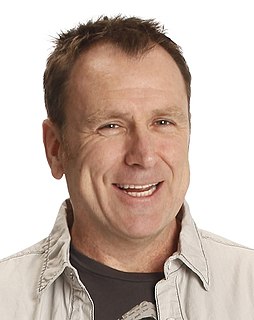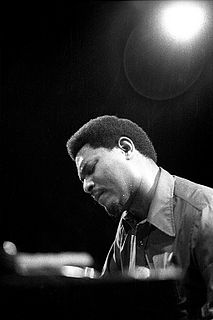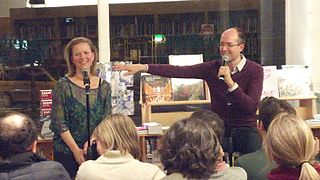A Quote by Colin Quinn
You know how it is with writing. You just write what you want to write. There's no way to predict what is good or bad. You just do what you think is funny, and either it works or you're finished. It's impossible to predict anything.
Related Quotes
When I first started writing, there was no way I'd write a sex scene. That just seemed impossible. That's why in "Fight Club" all the sex happens off-screen. It's all just a noise on the other side of the wall or the ceiling. I just couldn't bring to write in a scene like that. So one of the challenges with "Choke" was I wanted to write sex scenes until I was really comfortable just writing them in a very mechanical way.
The most common thing I find is very brilliant, acute, young people who want to become writers but they are not writing. You know, they really badly want to write a book but they are not writing it. The only advice I can give them is to just write it, get to the end of it. And, you know, if it's not good enough, write another one.
I can't stress enough how important it is to write bad songs. There's a lot of people who don't want to finish songs because they don't think they're any good. Well they're not good enough. Write it! I want you to write me the worst songs you could possible write me because you won't write bad songs. You're thinking they're bad so you don't have to finish it. That's what I really think it is. Well it's all right. Well, how do you know? It's not done!
To write weekly, to write daily, to write shortly, to write for busy people catching trains in the morning or for tired people coming home in the evening, is a heartbreaking task for men who know good writing from bad. They do it, but instinctively draw out of harm's way anything precious that might be damaged by contact with the public, or anything sharp that might irritate its skin.
To me living and music are all the same thing. And I keep finding out more about music as I learn more about myself, my environment, about all kinds of different things in life. I play what I live. Therefore, just as I can't predict what kinds of experiences I'm going to have, I can't predict the directions in which my music will go. I just want to write and play my instrument as I feel.
Any negative review you write, they'll say, "Oh, you're being so mean." I think the problem with a lot of criticism is that too many critics either write just description or they write in a Mandarin jargon that only a handful of people can understand, or they write happy criticis - everything is good that they write about. I think that's really not good. I think it's damaged a lot of our critical voices.
I write fiction longhand. That's not so much about rejecting technology as being unable to write fiction on a computer for some reason. I don't think I would write it on a typewriter either. I write in a very blind gut instinctive way. It just doesn't feel right. There's a physical connection. And then in nonfiction that's not the case at all. I can't even imagine writing nonfiction by hand.
The secret to writing is just to write. Write every day. Never stop writing. Write on every surface you see; write on people on the street. When the cops come to arrest you, write on the cops. Write on the police car. Write on the judge. I'm in jail forever now, and the prison cell walls are completely covered with my writing, and I keep writing on the writing I wrote. That's my method.
I don't want to write poems that are just really clear about how I'm aware of all the traps involved in writing poetry; I don't want to write fiction that's about the irresponsibility of writing fiction and I've thrown out a lot of writing that I think was ultimately tainted by that kind of self-awareness.
I would say just start writing. You've got to write every day. Copy someone that you like if you think that perhaps could become your sound, too. I did that with Hemingway, and I thought I was writing just like Hemingway. Then all of a sudden it occurred to me - he didn't have a sense of humor. I don't know anything he's written that's funny.
I think a lot of the writing, you know, I write is just kind of like that where, you know. I write exactly how I'm feeling sometimes, and hardships that I'm going through. But I always end up, like the choruses are like, "God, You are good. God, you're faithful. You know, I know You understand, You're right here by my side." All these different things. And I just say very personal experiences that I've been through. I mean, it's not always detrimental thing.


































